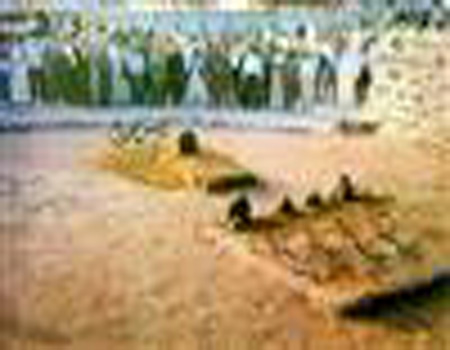
Before his martyrdom, when Imam Sadiq (A.S.) was surrounded by his relatives, his last advice was: "One who belittles Salaat will be deprived of our intercession. (Amali al-Sadooq P.290)
Belittling Salaat means:
1. Performing daily prayers without relishing grace of God.
2. Saying prayers for pleasing the superiors; without presence of mind & heart.
3. Not saying prayers promptly in time till it is lapsed.
4. Not getting up early for morning prayers because of not sleeping early and over eating.
5. Neglecting obligatory prayers for the sake of marriage parties, watching television, football matches cinema films and other similar activities.
Salaat is the pillar of religion without the pillar it falls down and collapses.
Prayers timings:
1. The time for morning Salaat is from the break of dawn i.e. ‘Fajr' up to sun rise it is better to say morning prayers before the stars vanish.
2. Zohr salaat: Its time is from noon to Asr. Noon is the time when the sun is in the middle of sky when shadows of all things are shortest.
3. Asr salaat : Its time is from afternoon up to sunset.
Note: The preferred time for Zohr Salaat is when the shadow of a vertical stick is equal to the length of the stick, and when the shadow is equal to twice the length of the stick that's the preferred time for the Asr Salaat. But often the holy prophet (S.A) had performed the two prayers together. The Zohr Salaat can be said from the beginning of noon up to Asr.
Maghreb Salaat: Its time is from complete sunset up to Isha.
Note: When the sun sets in the west, it is apparent sunset but sunset is complete when the rays of the sun also disappear. i.e. the red glow of the rays of the sun should disappear from the Eastern part of the sky. Then a person may be sure that the sun has set completely.
When a person fasts from dawn to dusk it is desirable not to break the fast until sunset is complete (as explained above).
Isha Salaat may be performed after the Taqhibaat of maghrib prayers, i.e. , reciting zikr & invocations, recitation of Quran and its commentary or listening to sermons after the Maghreb Prayers. The holy prophet used to combine Maghreb and Isha prayers whenever convenient.
Nawafel are thirty four rak'at of salaat which are not obligatory. Most people glorify God on rosary (Tasbih).
The Tasbih of Hazrate Fatima Zahra (S.A) may be recited after each daily prayer and that its reward is equal to saying one hundred rak'at of non-obligatory prayers.
Tahajjod salaat may be performed from midnight up to call for morning prayers, it is highly recommended and is a cure for a number of diseases when performed sincerely in Love of the Most Lovely Existence.
Note: A person should not have stinking feet and socks with foul odor. When he says prayers it is desirable to wash and dry the feet before wiping the feet for ablution.
Note: Imam Khomaini (R.A) has said that Muslims are quarrelling about folding their hands in prayers or not, while their common enemy is aiming at cutting their hands. (Shia's and Maliki Sunnies do not fold their hands during salaat.)
source : www.abna.ir













